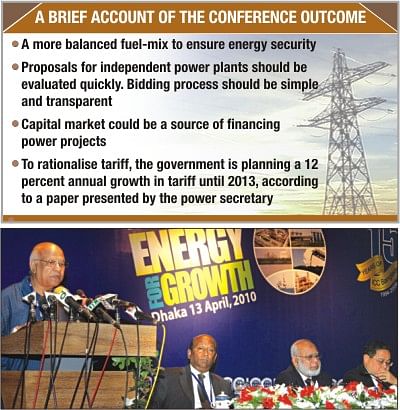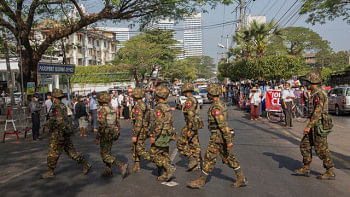Lengthy process sets back power projects

Finance Minister AMA Muhith speaks at the launch of ICC Conference -- Energy for Growth, organised by the International Chamber of Commerce-Bangladesh (ICCB) at Radisson Water Garden Hotel in Dhaka yesterday. ICCB Vice President Latifur Rahman, left, ICCB President Mahbubur Rahman, middle, and International Chamber of Commerce (ICC) Chairman Dr Victor K Fung, extreme right, are also seen. Photo: STAR
The government should bring all the energy projects under a single committee to accelerate implementation, said experts yesterday.
A power project, public or private, needs to hurdle over at least five major committees for getting approval, which sometimes takes years under the existing process, they said.
They were speaking at a discussion on 'Power project development: Exploring the critical path' at Radisson Hotel in Dhaka.
International Chamber of Commerce-Bangladesh (ICCB) organised the discussion as part of its daylong conference on 'Energy for Growth' at the hotel where energy experts, bankers, academicians and entrepreneurs from home and abroad spoke.
Syed Manzur Elahi, chairman of Apex-Adelchi Footwear Ltd, said the country has made a 40 percent demand-supply gap of power over the last 20 years.
"One or two committees are enough for a project approval," Elahi said.
Toshiro Maruo, assistant general manager, Power Projects and Infrastructure Administration Department of Japanese Marubeni Corporation, said he has bitter experience about Bangladesh as his company has to participate for seven times in a bidding in energy sector.
The delay in implementation increases the cost of the projects for which ultimately the prices of the outputs go up and the end-users need to pay high, he said.
"We demand quick approval of the power projects," he said, adding that Marubeni Corporation is participating in the ongoing bidding for new power projects.
Suggesting a single committee for project implementation, Muhammad Aziz Khan, chairman of Summit Group, said the main challenge for the energy sector is the delay in decision making.
Tariff goes up because of a lengthy process, he said.
Steve Wilson, president of Chevron Bangladesh, suggested energy conservation as a short-term solution, enhanced maintenance at the existing gas fields as mid-term and onshore exploration as long-term solution for the energy sector.
Lars Bentzon Goldschmidt, deputy director general of DI Confederation of Danish Industry, said Denmark underwent an acute power crisis in 1972 as the country was fully dependent on petroleum products for power generation. "But later coal-based power generation solved the problem," he said.
Abul Kalam Azad, secretary to the energy ministry, said even the private sector companies do not supply the promised electricity in time although they take advance payment.
"We have taken a lot of projects and plans to meet the growing demand for electricity."
Country Director of World Bank Ellen Goldstein said Bangladesh is in the grip of a serious energy crisis with multiple dimensions.
"I want a single committee (for power project approval)," said Fazlul Hoque, president of Bangladesh Knitwear Manufacturers and Exporters Association.
ASM Alamgir Kabir, chairman of Bangladesh Power Development Board, and Munawar Misbeh Moin, director of Rahimafrooz Group, also spoke at the session.

 For all latest news, follow The Daily Star's Google News channel.
For all latest news, follow The Daily Star's Google News channel. 



Comments